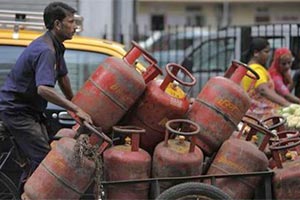
New Delhi, November 1: The price of non-subsidised cooking gas (LPG), which consumers buy beyond the cheaper quota of six cylinders, was today hiked by Rs 26.50 to Rs 922 per unit on firming international rates.
The 14.2-kg cooking gas cylinder that consumers buy beyond their entitled six bottles at subsidised rates, will now cost Rs 922, up from Rs 895.50 in Delhi, according to Indian Oil Corp, the nation's largest fuel retailer.
The government had in September restricted the supply of subsidised domestic LPG cylinders to six per household in a year.
Any requirement above this will have to be bought at market rate, which is more than double the subsidised price of Rs 410.42 per cylinder in Delhi.
State-owned oil firms revise rates of non-subsidised LPG on 1st of every month based on the average imported cost and rupee-US dollar rate during the previous month.
There is no restriction on the number of non-subsidised cylinders that a consumer buys beyond the six subsidised bottles.
The price of commercial 14.2-kg LPG cylinder in Delhi will be Rs 1,105.5, while that of a 19-kg bottle would be Rs 1,551.
A commercial or non-domestic cylinder was previously priced at Rs 1,075 per 14.2-kg bottle. Similarly, the 19-kg cylinder was priced at Rs 1,536.5.
Rates of non-subsidised 14.2-kg cylinder and those of commercial bottles of the same size differ because the government has granted exemption from customs and excise duty on non-subsidised LPG cylinders only for domestic consumption to reduce the price burden on the common man.




Comments
Add new comment